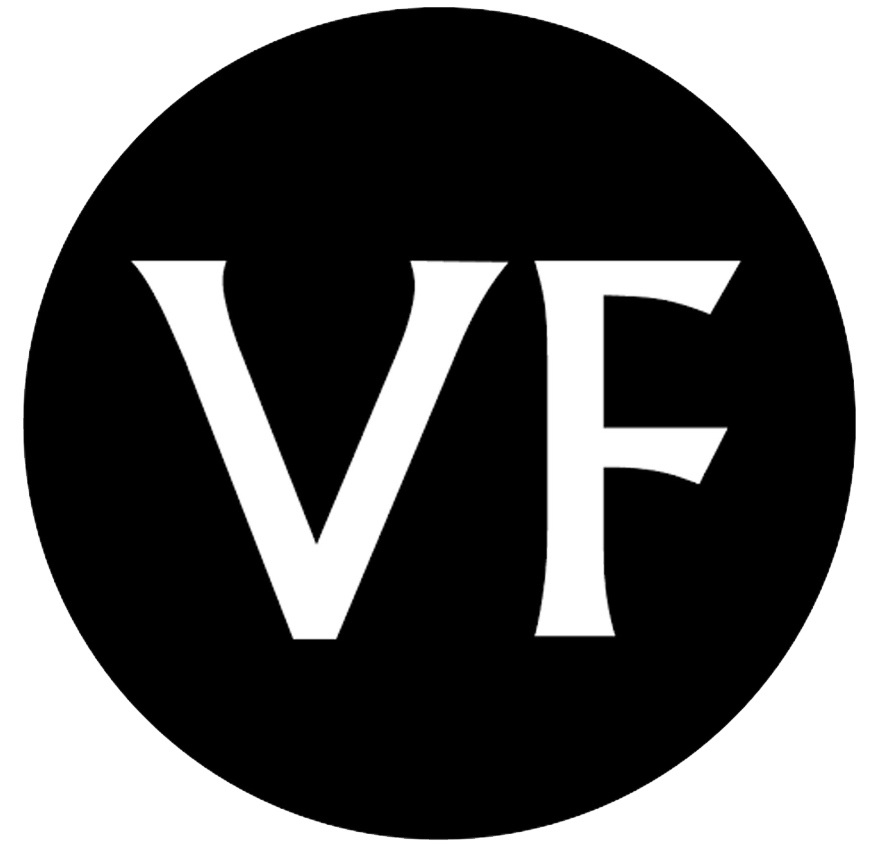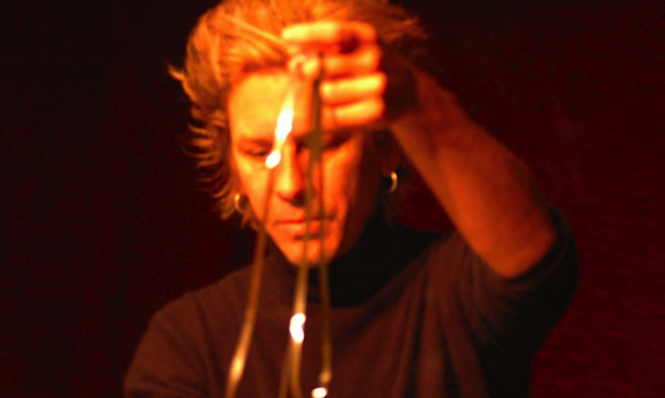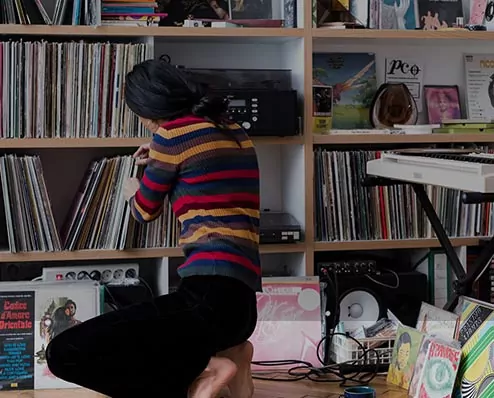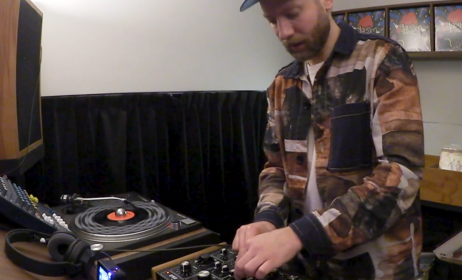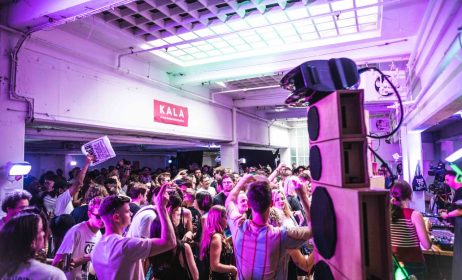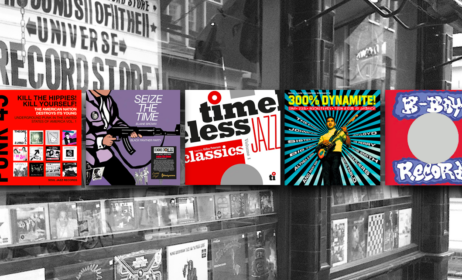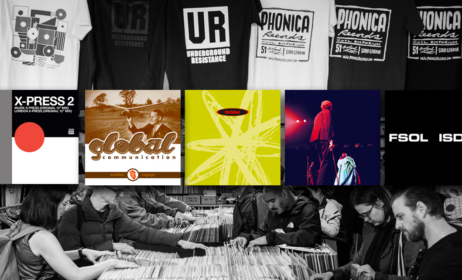Published on
August 6, 2013
Category
Features

The composer of the seminal Disintegration Loops talks about the influence of Cage, Reich and Eno, being recognised and his new album Nocturnes.
Despite all the potential for contradiction, there’s something particularly fitting about meeting William Basinski in a church. His music, the perfected art of tape-looping, is built on a mechanical process rather than a metaphysical urge and yet the title of his new album Nocturnes has its roots in the canonical hour of Matins. His 2001 “masterpiece” The Disintegration Loops speaks of beauty in slow decay, and yet the high-rise spires emerging from the smokey ruins of 9/11 on the cover suggest spiritual redemption. He likens the years spent creating loops without appreciation to a period of monastic solitude, and yet, with the support of his partner James Elaine, has amassed a vast archive of work which is finally beginning to see the light of day. Even his influences, pioneers of the most secular forms of classical, minimal and ambient music, represent a holy trinity of sorts.
Nocturnes, released earlier this year on Basinski’s own 2062 label draws on some of his earlier loops; it is dense and brooding, and just shy of three-quarters of a hour, feels compacted in relation to Basinski’s opus the Disintegration Loops, which falls apart over four full-length albums (collected in a 10th anniversary box set last year), the story of which is now inscribed in American 21st century folklore. Returning to loops he’d made twenty years earlier, Basinski set about digitalising parts of his cassette archive in the summer of 2001 to protect them from material decay, but in transferring the content found the tape freeing itself from its iron cladding, clausing the loops to disintegrate during the recording process
A moment of sublime chance that John Cage would have been proud of, Basinski managed to capture the deterioration of the looping tape in all its eerie beauty. A month later, on the morning of 11th September 2001, Basinski woke in his Brooklyn apartment to watch the Trade Centre collapse, the final hour of daylight from which he documented in a film that would grace all four covers of the subsequent Disintegration Loops LPs.
In London at the end of June and on stage at the St. John Sessions, he sits behind his reel-to-reels deep in concentration, his tousled shock of blonde hair tied up in a nest as if to mimic the extravagant headpieces of the classical composers from which Basinski has borrowed a name for his latest release.
We meet in the pews of the balcony at St John-at-Hackney. Basinski, like any good secular evangelist, orders a beer up from the rectory and settles down to talk about his work with the controlled indulgence of someone who’s yet to be bored by his own story. Half a lifetime of artistic obscurity and all its attendant existential anxieties now form a crucial part of the narrative, which hinges on a September morning in downtown Manhattan and an job interview at the World Trade Centre that never took place.
Let’s start at the beginning. How does a young man growing up in 1970’s New York become interested in something as essentially esoteric and solitary as tape-looping?
Well, I was classically trained and I worked very hard at that and I went to musical school and studied jazz. I thought I was pretty good and I went to a pretty good jazz school, but I wasn’t nearly as good as the guys that I heard audition before me – they were monsters.
And I was a very nervous auditioner and totally screwed up my audition, so I didn’t get in, but I did live in a music dorm and all these young kids my age were very talented and we would go and practice and create bands of our own and stuff like that, playing on the weekends and having a lot of fun doing that. I was developing my own style on the saxophone, but I switched my major to composition and studied Cage and learned a great deal from him about chance and all kinds of things that you could do that were allowed.
I also knew a lot of people who were record collectors and always had the coolest stuff. Steve Reich’s Music for 18 Musicians came out and then Eno’s Music For Airports came out and that just blew my mind with its melancholy sound and so eventually I met Jamie [James Elaine] who was a huge music aficionado who always worked in record stores so he’d come home with armfuls of records. He had everything, German experimental electronic people, everybody going way back to [Iannis] Xenakis, you name it.
And there was a – it’s on Discreet Music – Fripp and Eno, there’s a diagram that shows their Frippertronics and so I just started looking for tape decks in junk stores and you could find them real cheap. I just started experimenting, first with overlaying on a cassette deck by putting a piece of tape over the erase head and randomly rolling back and forth with themes that I was creating on an electric piano at the house I was sharing. And eventually it evolved and I started getting more and more into it and this was the way I could create something that interested me. I didn’t know if I was really a composer but I was painting.
Was it as immersive to create as it is to listen to?
Oh yeah, that’s why I still like working with tape in the shows because it’s tactile, you lay them down, you have to make sure they don’t get crunched up under the wheels of the car, just like children, you know. You got to keep a good eye on them.
You were making music in the late 70’s and 80’s, you had the Brooklyn venue Arcadia in the 90’s, but your solo discography only begins in 1998. What took you so long?
I always wanted to put out a record, everyone does. I pined for years in the early days for some of these extraordinary pieces, that some people now call masterpieces, but I just couldn’t understand why nobody got it. Some people did, a little bit, in the art world, but not too much. I mean Jamie and my other roommate Roger Justice, another extraordinary painter who nobody knows about but should, they got it, but we were almost like monks in an abbey making the distilled liquors that would have to sit around for twenty years before they really were perfect.
In a sense that waiting, when it came to digitalizing what became the Disintegration Loops, was the catalyst, the secret ingredient…
That was the secret ingredient. I almost didn’t make it but somehow I did.
It is a moment where your career hinges. While you were transferring the music, at what point did you realise that something was happening beyond your control?
It was about fifteen minutes into the first loop and I’d gone to get a cup of coffee, I was really starting a new composition and was very excited about what was going on and had this beautiful, grave melody that I didn’t even remember, and then I had set up a counter-melody that was happening really nicely and I had the levels set and I was just going to let it go for a while which is how I work and try to see what happens. It was an experiment.
Anyway, I went to make a cup of coffee and came back and checked everything and I’m looking down into the tape deck and I could see dust is coming off the tape and it’s starting to change and I thought “Oh my God it’s happening”.
There’s something poignant about the slow decay of sound…
Yeah, the rust is turning back to rust. Dust to dust. And so I was checking to make sure I was recording and got chills and goose flesh and then it all just started happening.
Has the piece always been inextricably connected with 9/11 or was that a connection that has only been made retrospectively?
Well, the pieces happened in early August 2001 and I spent the month marvelling over them, thinking about them, friends came over, listening to them. But you know, I was going to apply for a job at the World Trade Centre that day, I was broke, I got an eviction notice on 9/11 and I was a nervous wreck.
So I was going to go apply for this job, but you know it all happened quite early, but I could see it from my bedroom and we saw the two towers collapse. One from the bedroom and then we ran up to the roof. So we were stunned, and I mean the whole world changed. It was a devastating experience for us just as people who witnessed it. For the people who lost members of their family it was just a horrible tragedy, you could never get over it. At that time we were all trying to do something. People became very nurturing with each other, even strangers.
You know I wanted to make sandwiches for the firemen or something like that but I couldn’t, I didn’t have the money and they wouldn’t let anyone in down there, but I had this work that I was doing and so I thought, well I’m an artist, this is what I could do and suddenly there were other artists coming around to encourage each other. After the 9/11 film, The Last Hour Of Daylight, which I shot that night, I just knew I had to keep going and when I made the video I knew it was an elegy and I thought I’m going to put a frame for each four parts of this video of each of the covers and make it dedicated to this and release them one at a time.
When Mrs Kennedy’s husband the husband was assassinated she wouldn’t take off her pink dress, which was blood-spattered for three days, and with everybody trying to tell her to take it off she said no “they need to see what they have done”.
Artistically, was the acclaim that it received in some a validation for you?
It was a blessing, such a long time coming, honest I really didn’t think I was ever going to see the day and it has just been such a blessing to be able to have your work recognised. For all you young people to love it – I mean touring sucks, it’s hard, and I live in California, it’s like Perth, Australia compared with coming to Europe, it’s a fucking long way – and I’m not as young as I used to be and it takes its toll but every time I do the show, that’s what it’s about. I’ll do it until I drop dead. You never know when the guillotine is going to come down.
You released Nocturnes earlier this year, which although it’s your most recent work is derived from some of your earlier tape recordings. When you hear these loops that you created thirty years ago or more do they have specific memories for you?
I’m sure, but I can’t even imagine how I did it, but I have the score I just found on an old yellow pad in pencil which I wanted to kind of include with the artwork in the CD but CD cases are too small and it just didn’t fit. I really want to do an LP version next year so we’ll include the score maybe on the sleeve.
What was it about Nocturnes that compelled you to release it now? Is it now a case of locating pieces from your archive and choosing a moment to release them?
Well there’s always that. I mean some pieces you feel like should be released, like a neglected child – it should have been released when it was new but its time wasn’t then so – but then there’s a lot of scratch work and trial and error and stuff that will never be released. Then there’s lots of loops that I created as people created patches in their synthesizers that I still like to work with, so I work with that and I’m always listening and recording and finding new things and I never know what the next one is going to be.
It took me four years to put this one out. I have to do everything myself, I have to go on the road, I have to run the office, do the artwork, do the mastering, it takes a while.
Performing them in this church to haunting visuals of a moon waxing and waning across a clouded, monochrome night sky it seems as though the environment make a difference in how people receive the music…
I love performing in churches. My work responds very well to reverberant space. Nocturnes is a little bit tricky because it is so dense and has so many clustered layers that weren’t really recorded the way they were supposed to be recorded. And of course it’s a holy space. I consider Nocturnes to be like a Passion anyway.
Finally, do you own a record collection?
No I’m not a record collector, but James my partner is so I have a house full of records. My older brother Mark was a record collector and when we were kids one of our earlier memories was seeing The Beatles on Ed Sullivan and that just changed the world! (He screams!) So we grew up waiting for the next Beatles album to come out and them blasting on the stereo until my mother would say “Goddam you kids turn it off!”. I don’t know what to do in record stores.
Nocturnes is out now on 2062.
